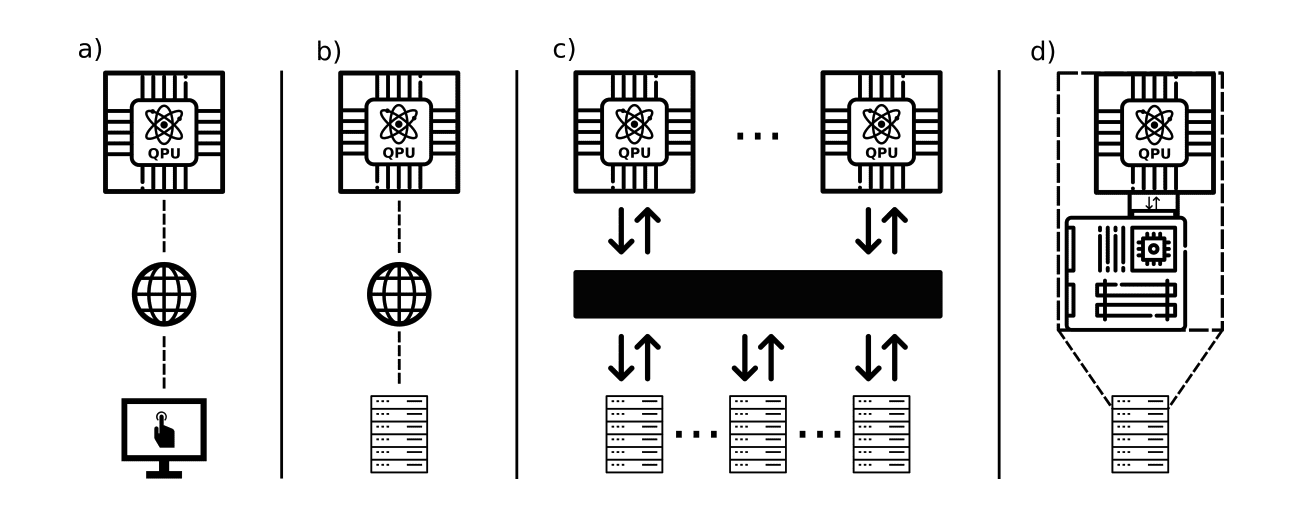The pursuit of computational power now extends to combining the strengths of traditional and emerging technologies, as researchers investigate the interface between high-performance computing and quantum computing. Konstantinos Rallis, Ioannis Liliopoulos, and Georgios Varsamis, alongside their colleagues at the National Centre for Scientific Research Demokritos and Democritus University of Thrace, present a comprehensive overview of this rapidly developing field. Their work details how these distinct computing paradigms can work together, examining everything from the necessary architectural designs and software frameworks to practical applications in areas like optimisation and machine learning. This analysis is significant because it highlights both the potential benefits and the considerable challenges involved in building truly hybrid computing systems, paving the way for future advancements in tackling previously unsolvable problems.
Hybrid Quantum-Classical Computing and Scalability
This collection of research paper titles and abstracts illustrates the current state of quantum computing, revealing both its potential and the significant challenges that remain. The research highlights key themes and trends, focusing on hardware and system architecture, particularly integrating quantum computers with High-Performance Computing (HPC) systems. This involves developing operating systems, scheduling strategies, and communication protocols to leverage the strengths of both approaches, alongside hardware-software co-design to address scalability issues and mitigate crosstalk. Beyond superconducting qubits, research explores alternative platforms like memristor crossbars and analog quantum computers, aiming to build systems capable of handling increasingly complex problems by optimizing qubit connectivity, gate fidelity, and control electronics.
Quantum algorithms and applications also receive considerable attention, with quantum chemistry and materials science leading the way. Researchers are simulating molecular energies and electronic structures using algorithms like the Variational Quantum Eigensolver and Quantum Monte Carlo, and exploring Quantum Approximate Optimization Algorithms for optimization problems, including protein docking. Quantum Machine Learning is a hot topic, with research into quantum neural networks and quantum generative adversarial networks, alongside algorithms for solving linear systems and simulating quantum systems. Designing efficient hybrid workflows that leverage both quantum and classical computers is essential for practical applications.
The software landscape is also evolving rapidly, with significant effort dedicated to optimizing quantum circuits to reduce gate count and improve fidelity. Developing standardized intermediate representations for quantum programs is crucial for portability across different hardware platforms, and robust compilers and toolchains are essential for translating high-level quantum programs into executable code. Overall, the collection highlights a field moving beyond theoretical exploration towards practical implementation and application, shifting towards building complete quantum computing systems integrated with existing HPC infrastructure.
Hybrid Computing, Architectures and Software Integration
This study comprehensively assesses the evolving landscape of hybrid computing, integrating High-Performance Computing (HPC) with Quantum Computing (QC) to address increasingly complex computational challenges. Recognizing the limitations of current Noisy Intermediate-Scale Quantum (NISQ) devices, scientists examine architectural methodologies, software stacks, and hardware integration strategies to maximize the potential of combined systems. The research details a spectrum of integration models, ranging from standalone configurations to tightly-integrated, on-node systems, critically evaluating the trade-offs of each approach for performance and scalability. The software ecosystem plays a crucial role, with frameworks facilitating communication and data transfer between classical HPC resources and quantum processors, enabling complex algorithms to be distributed across both platforms.
Harnessing the capabilities of quantum computers requires specialized data handling and problem formulation, acknowledging the unique challenges of programming these novel systems. The research investigates practical applications in optimization, machine learning, and many-body dynamics, where hybrid HPC-QC systems promise substantial advantages over classical approaches. Scientists acknowledge current hardware limitations, including coherence, scalability, and connectivity, while also addressing software maturity, communication overhead, and resource management complexities. As quantum hardware evolves, with an increasing number of qubits becoming available, scientists anticipate expanded capabilities and accessibility, paving the way for more powerful and versatile hybrid computing solutions.
HPC and Quantum Computing Integration Strategies
The convergence of High-Performance Computing (HPC) and Quantum Computing (QC) represents a significant leap in computational technology, promising solutions to problems previously considered intractable. Researchers have extensively analyzed the architectural methodologies, software ecosystems, and hardware integration strategies necessary to realize this hybrid approach, detailing a range of integration models from standalone systems to tightly-integrated on-node designs. The analysis highlights the crucial role of software frameworks and middleware in enabling seamless communication and resource management between classical and quantum processors. Several prominent quantum computing frameworks now offer tools specifically designed for HPC integration, including Qiskit and PennyLane.
Qiskit, a Python-based framework, provides both ideal and noise-aware simulators for testing quantum algorithms and interfaces for executing circuits on IBM’s quantum computers. PennyLane, also Python-based, excels in Quantum Machine Learning and supports a variety of quantum hardware, including superconducting qubits and trapped-ion systems. Beyond these frameworks, platforms like Cirq from Google and cloud-based services such as AWS Braket and Azure Quantum offer comprehensive environments for building and deploying hybrid algorithms, demonstrating a growing trend towards accessible and integrated HPC-QC systems.
Hybrid Computing, Architectures and Software Progress
This work presents a comprehensive overview of the evolving field of hybrid High-Performance Computing and Quantum Computing, detailing the current state of hardware integration, software development, and middleware solutions. The analysis reveals a clear trajectory towards combining the strengths of both classical and quantum systems, establishing a foundation for tackling complex problems beyond the reach of either modality alone. Architectural models range from loosely-coupled systems, offering ease of implementation, to tightly-integrated designs aiming for minimal latency, with on-node integration viewed as the long-term performance ideal. While the software stack is maturing, further improvements in interoperability and developer tools are still necessary. The authors acknowledge existing limitations including hardware challenges related to coherence, scalability, and connectivity, as well as the complexities of resource management and cost. Future work will likely focus on tighter hardware and software integration to expand the capabilities and accessibility of these hybrid systems, building upon the current advancements in frameworks and middleware.
👉 More information
🗞 Interfacing Quantum Computing Systems with High-Performance Computing Systems: An Overview
🧠 ArXiv: https://arxiv.org/abs/2509.06205

